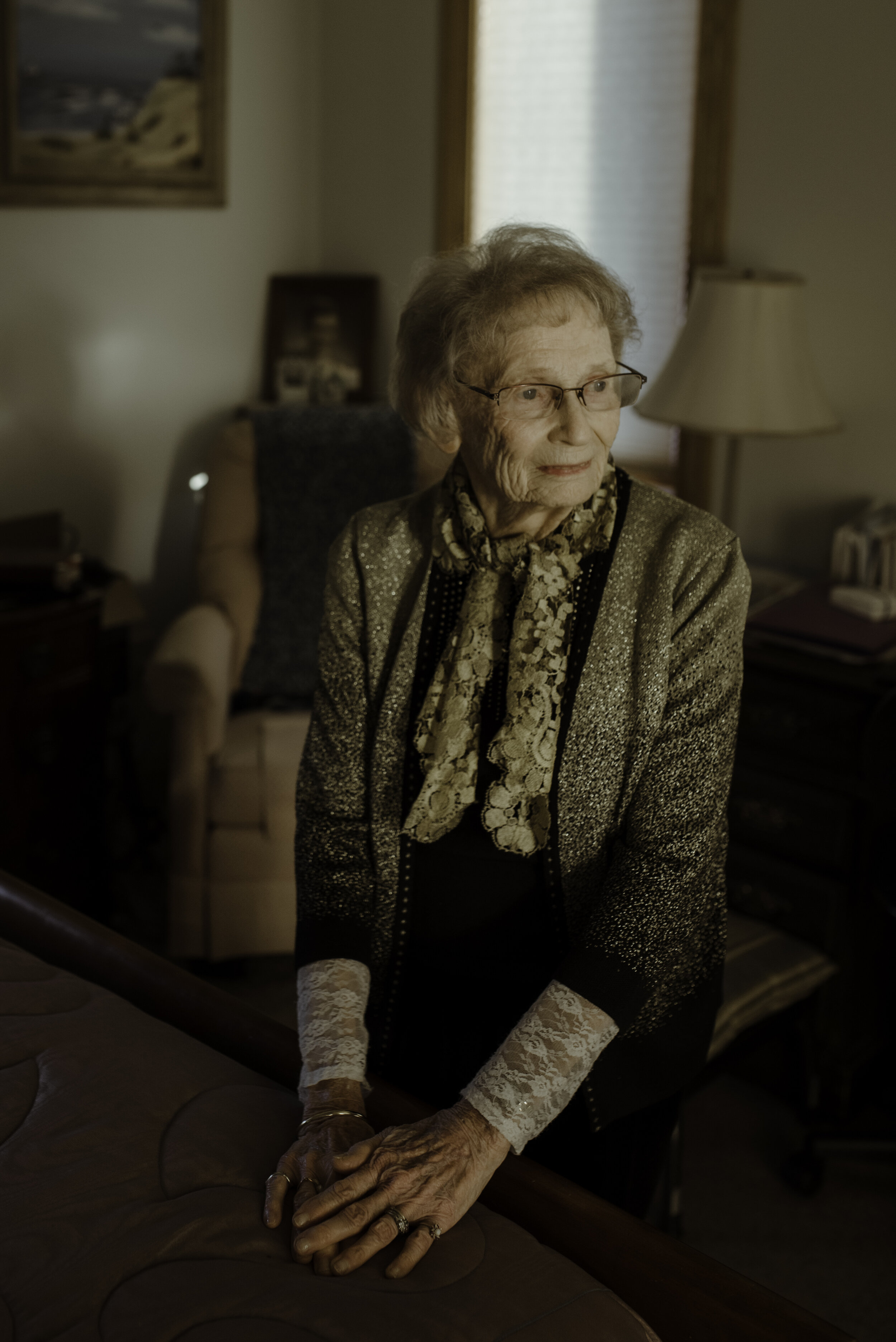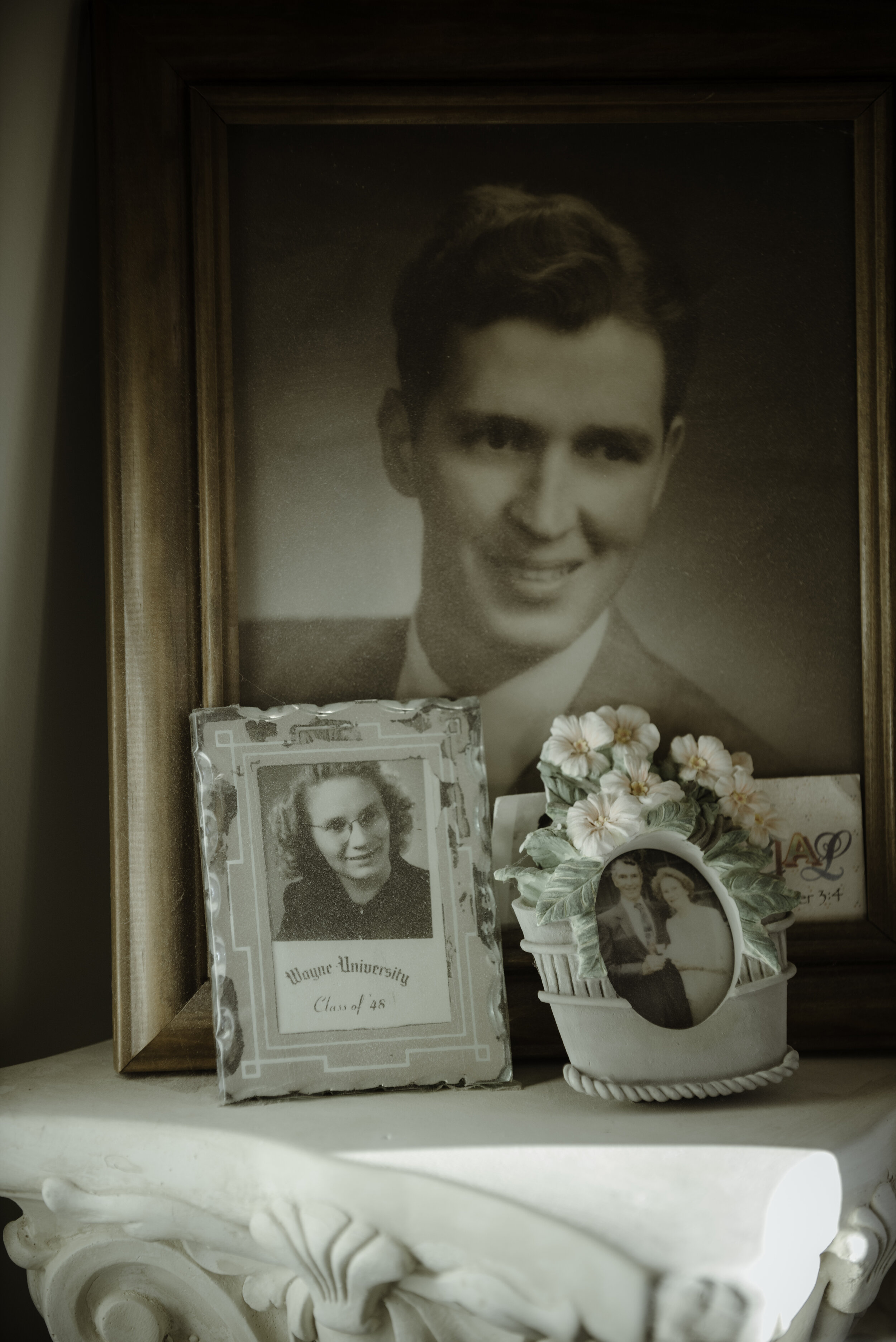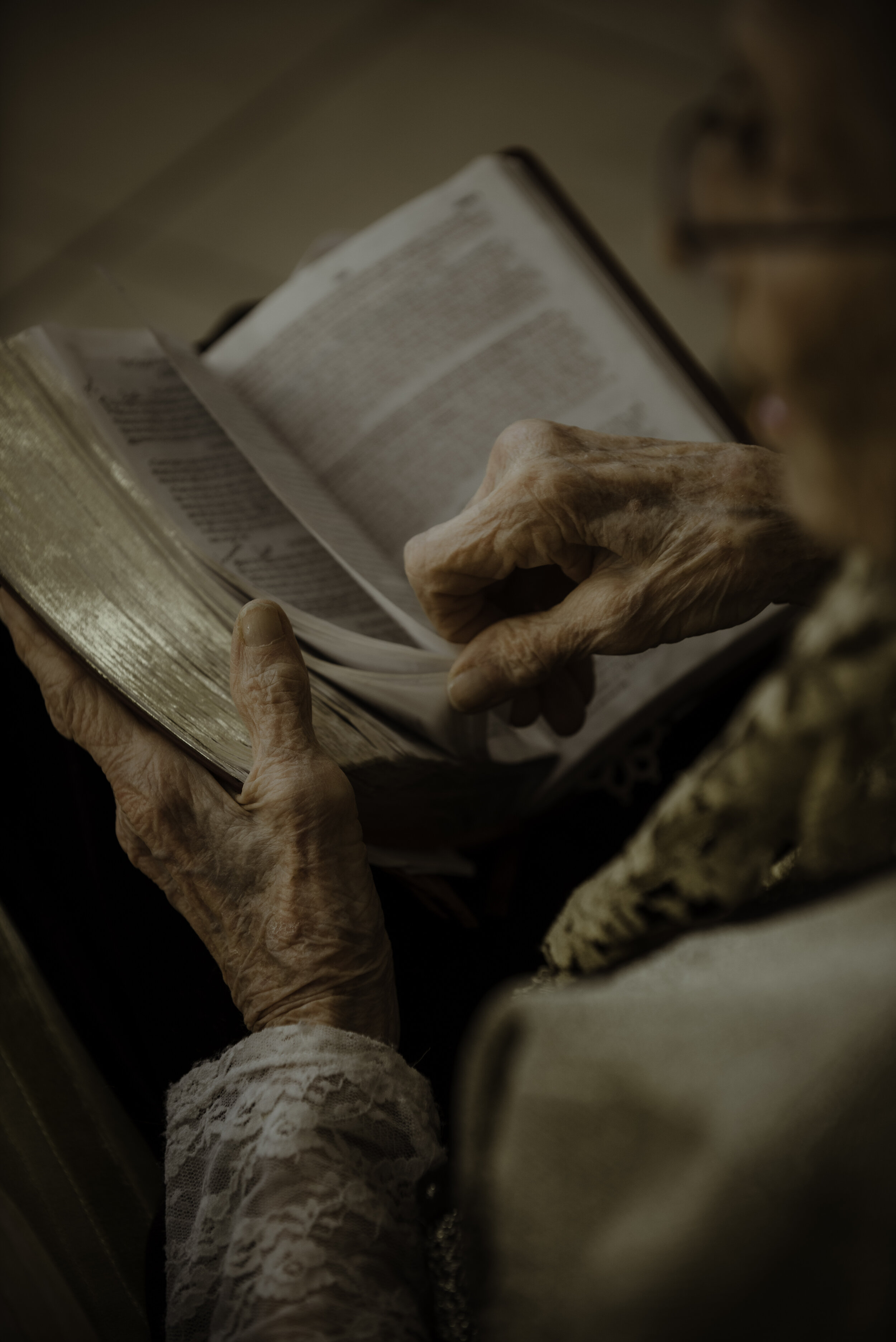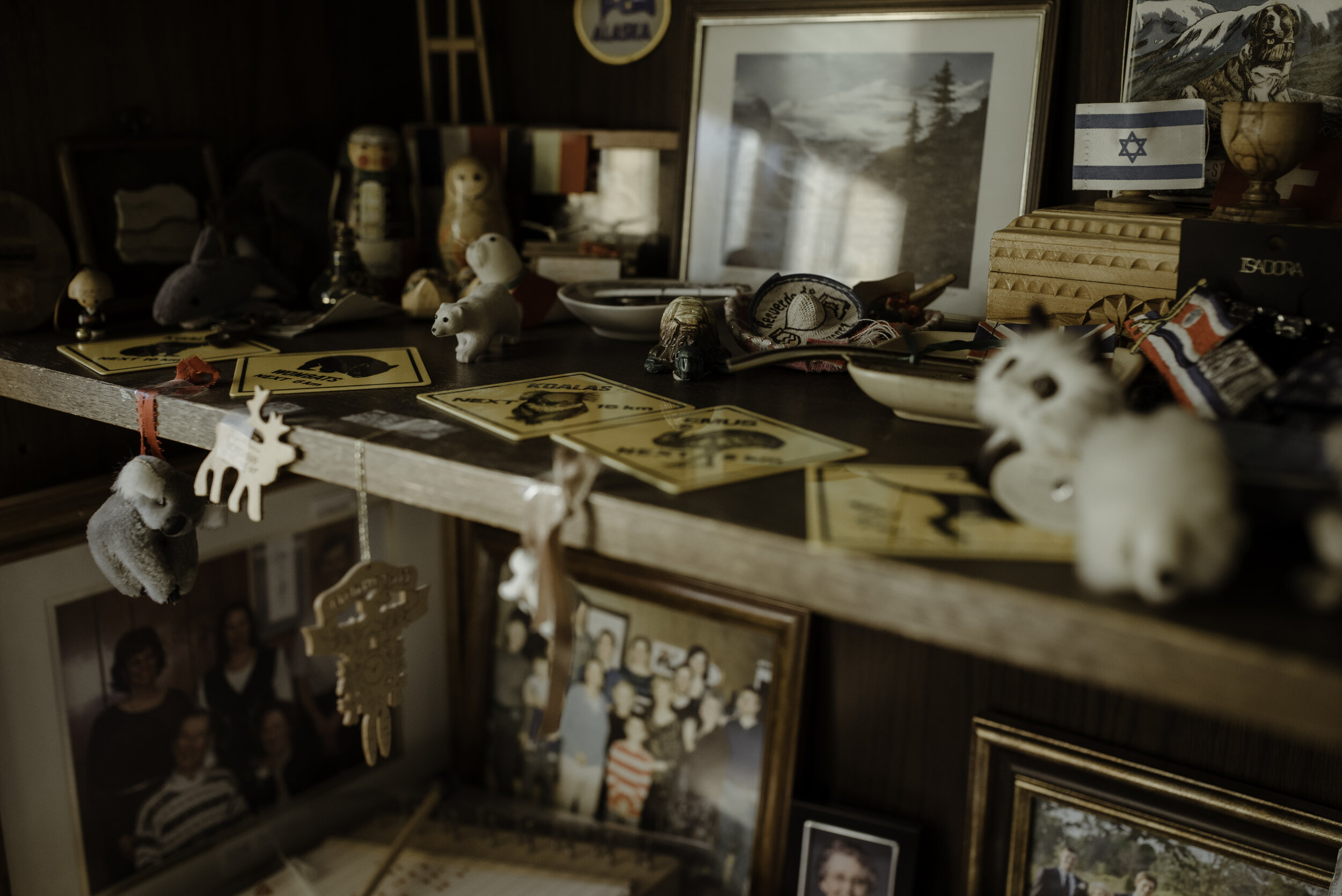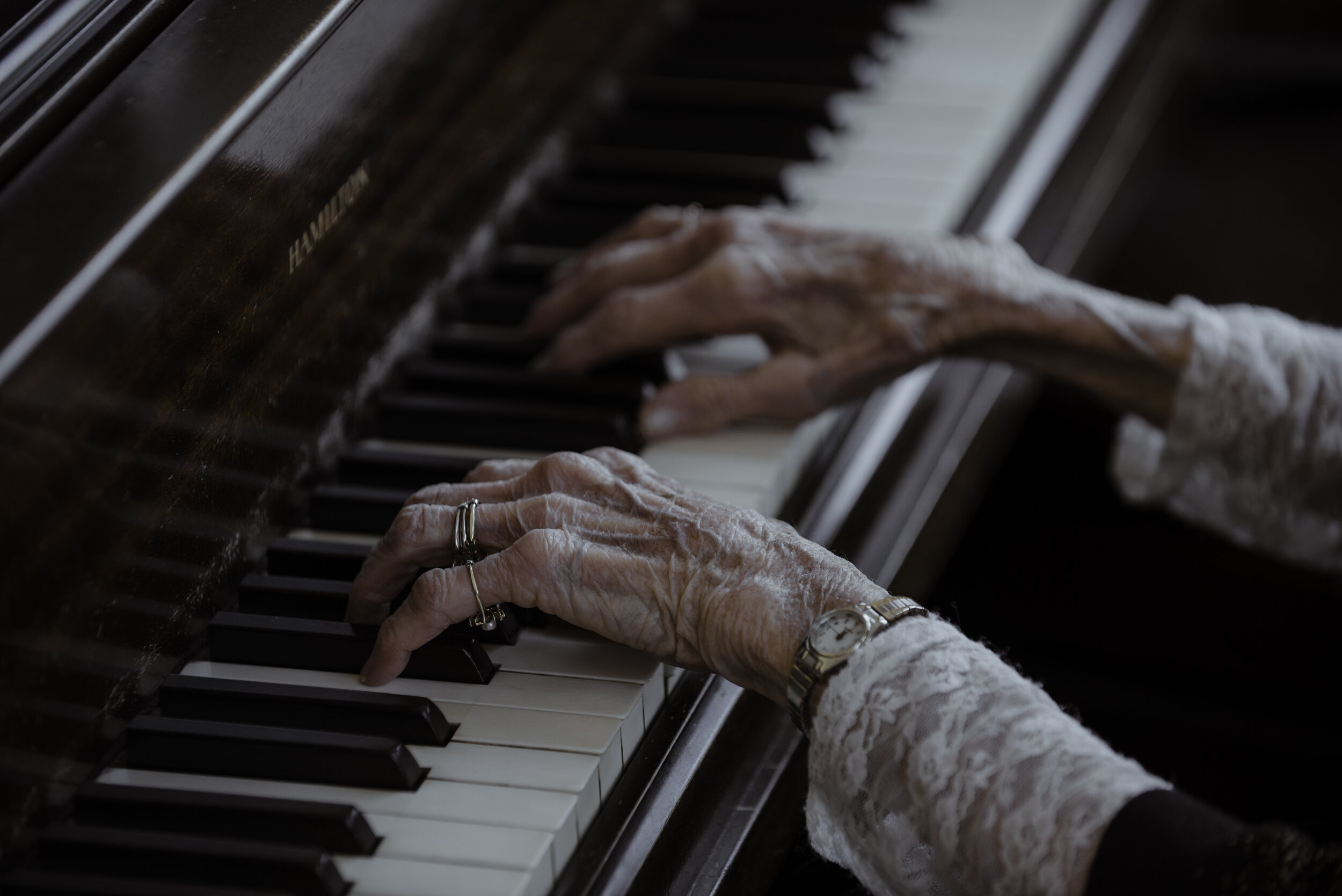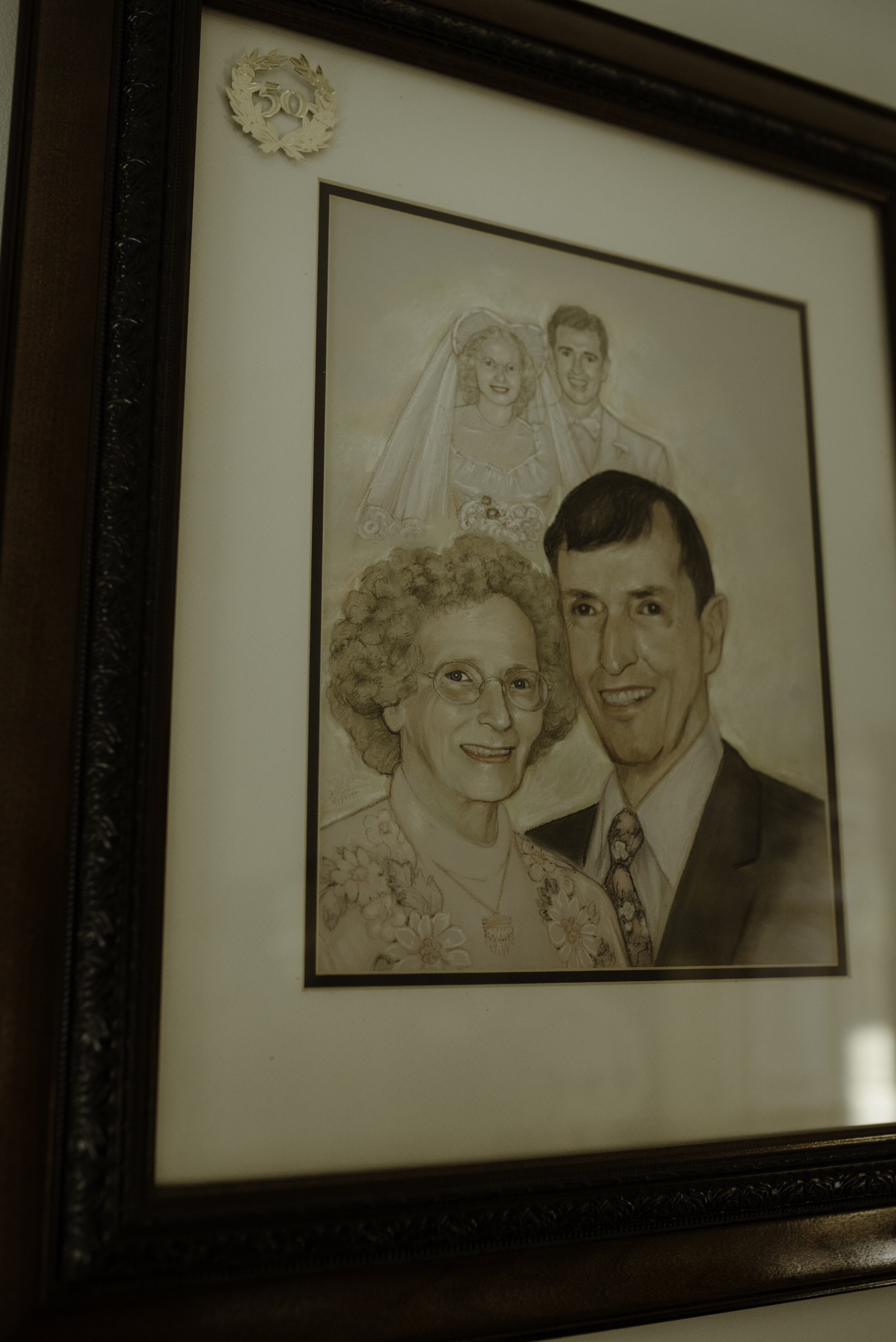“Only one life, 'twill soon be past, only what's done for Christ will last.”
On the day of our visit, Carol greets me at the door with a smile, dressed to the nines in a coordinating sweater and skirt duo complimented with accents of thoughtfully placed lace. Come to think of it, “thoughtful” is a perfect word to describe this classy lady of a bygone era. We had been corresponding by email for about a month before this, while Carol was visiting family out of state. She had expressed a mix of curiosity and gratitude when I asked if she’d be willing to be a subject for a new portrait series I was working on. Her only request was that we coordinate our session date with her hairdresser, and that I give her time to get through the backlog of mail that would inevitably be piled up upon her arrival. I received the report a day after she returned home, “290 pieces of mail!” I follow Carol into the house as she begins her tour, weaving in bits of her life story as she points out portraits and heirlooms. Any mystery surrounding her poised disposition quickly departs. Carol was born into a world very different from mine, a world where self-sacrifice and self-discipline were traits necessary for daily life. A lifetime of rising to the occasion has produced a grace in this lady that is far heartier than her slight frame would suggest.
Carol was born in December of 1926, the eldest child of Charles and Mabel Schermerhorn. She would watch her parents weather the Great Depression in Detroit in her early years. Her father had worked for the city of Detroit, up until the point it went bankrupt in the historic crash. Her family relocated to Flint for work when Carol was in first grade. She had begun playing the piano a couple of years before, and her parents made sure to bring the piano with them so she could continue her studies. She remembers sitting in middle school Latin class, just days before her 15th birthday, when the announcement was made that the US had entered World War II. By the time she turned 16, rations were being imposed on the valuable commodities of meat and gasoline. Because gasoline was limited to 4 gallons a week per family, the luxury of driver’s ed was out of the question at the time.
Carol recalls the somber atmosphere that pervaded her world during those years; Hearing of the air raids in Britain, and the devastation happening in Europe. The tension even spilled into the atmosphere at church, when the pastor would announce from the front each Sunday which boys had been drafted that week. For years, her social circles disproportionately female. As the boys began returning home after the war, they were quick to pair off with a girl to get married and start a family, making up for lost time. At this point, Carol was attending Detroit’s Wayne University (that would later become Wayne State) and studying to become a teacher. “My mother told me if I wanted to go to college to get an education, fine. But if I wanted to go to college to get a husband, I could forget about it.” Carol kept her sights trained on completing her degree. By age 23, Carol had a list of reasons why she thought she would never be a wife, one of these being her “advanced” age. Seeing my eyebrows raise at this, Carol pauses to smile. “I know, it was quite different back then. People married young and started families young.” Though her faith had always been central to her life, Carol says that attending university challenged that foundation in a way she did not expect. “Not that it made me doubt my beliefs, but I had to learn to stand firm and have an answer for these things.” Surrounding herself with other Christians became vital to remaining grounded in an environment hostile to her faith. Carol began attending Intervarsity group at Wayne, one of the earliest chapters of the Christian student group that still exists on many campuses nationwide. It was here, when she least expected it, that she met the man who would become her husband of 51 years. Carl Young was 8 years Carol’s senior, but one year behind her in his studies because of his years serving in the army. Carol gets a slightly dreamy look in her eye as she reminisces about the love of her life. “The Lord brought us together in a wonderful way.” Carl proposed in 1949. He had intended to give her the ring on his birthday, but forgot, and had to settle for the day after. “He said if I married him, I’d always be Young. The day he proposed, we were at a church service together. Afterward, he told me he had a question to ask me. ‘How do you think I’d fit into your family?’ And I said, ‘just perfectly!’”. And that was that. As they began wedding preparations, they started a practice that would be the foundation for the rest of their lives together. “We would pray together, before we were married, and all throughout our 51 years together, to seek the Lord’s guidance in every area of our lives.”
In August of 1950, Carol graduated with her degree, and married Carl a few days later. She laughs, “I got my master’s and my Mrs in the same week!” By the way, her wedding gown is currently showcased in a museum. When I ask how that makes her feel, her face lights up. “I love it! It made me so excited that people can enjoy that dress!”
She and Carl lived a full, vibrant life together, and raised four children. They were both teachers with a shared passion for both education and music. Carl was a band teacher and played the tuba. Worship and music always went hand and hand for the couple. “Carl would quote Psalm 150:6 before he played. ‘Let everything that has breath, praise the Lord.’ Then he would say, "My tuba and I are going to praise the Lord.’” Having lived through both the Depression and the Second World War, the young newlyweds were no strangers to hardship and the necessity of reliance on God. I ask Carol if there were any particularly scary times in her life. After a few minutes of thoughtful silence, she says, “I wouldn’t say scary. Just hard situations. Our second daughter became diabetic at age ten, and she went to be with the Lord in her forties.” She smiles with the emotion of a thousand bittersweet memories in her motherly eyes. “I always told her she kept me close to the Lord.”
In the years after their children were grown, the couple spent a great deal of time traveling together. Some of these trips were just to explore, but some were for the purpose of connecting with and assisting in the work of missionaries throughout Europe, China, and Japan. Carol remembers these times with immense fondness, and she keeps a little shelf of her global souvenirs in her room where she can reflect on those memories daily. “Everything is new and special when you’re traveling. Everything is an experience.” She can’t tell me what her favorite place is, because she can’t choose just one. But oh, how she cherishes those adventures spent with her husband.
As we admire the beautiful painting of her and Carl that she received as a gift for their golden anniversary, I ask her, “So what’s the secret? What’s your advice for couples who are working their way up to that golden anniversary?”
“Do things together.” She says simply. “Not just the big things; Do your taxes together. Make plans together. And don’t get distracted by material things. Remind yourself of the things that will matter, even after you’re both gone.”


